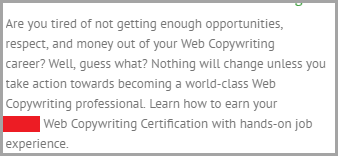
These days everyone wants to become a freelancer and work for themselves.
The problem is that everyone who doesn’t really have a marketable skill, but DOES have a computer and access to the internet, decides that they are going to be a copywriter.
All you have to do is string some words together to make a sentence, string sentences together to make a paragraph and string paragraphs together to make one whole page of words that kind of make sense.
That’s easy enough and any idiot could do it right?
WRONG!!
SEO copywriting is not just about stringing words together, it is about finding the RIGHT words that do what you need them to.
So if you REALLY want to become a copywriter, here are some simple mistakes you should avoid at all costs!
1. Not doing your research

Before you put pen to paper, or fingers to keyboard, it is crucial that you have done as much research as possible and that you know as much as you can about whatever you’re planning on writing about.
Now this does not mean that you need to be an industry expert before you can write an article about something. But it does mean you need to UNDERSTAND what you are going to say – because if you don’t understand yourself, how is anyone else going to understand you?
This is ESPECIALLY important if you’re writing anything that uses technical jargon of any kind, because an expert will know that you had NO IDEA what you were talking about.
The consequence? You’re going to lose a client if you’re freelancing, and lose potential customers/visitors if you’re writing for your own site!
What you should do:
- Research everything before you’ve even started writing
- Don’t rely on a single source for all your research
- Don’t stop researching until you understand what you’re writing about, who you’re writing for and every fact you’re using for your piece
2. Believing your spellcheck is all powerful

Many inexperienced copywriters believe in the power of their spellcheck, but as this poem shows, just because your spellcheck hasn’t marked a word as incorrect – it doesn’t mean the spelling is right!
Most word processing programs also have a grammar check, but they use an algorithm to find and mark those errors. And when a computer is determining what is wrong and what is right – it is wrong A LOT of the time!
People like to make fun of the ‘grammar Nazis’, but ¾ of web users pay attention to spelling and grammar on a website, and over 50% of them will avoid doing business with a company that makes obvious spelling and grammar mistakes!
What you should do:
- Never assume your spellchecker will catch every spelling and grammar mistake, or that it is always right
- If you’re unsure about the spelling of a word, then check it
- Proofread what you’ve written, then take a break and read it again – and then another time!
3. Overcomplicating everything you write

Another thing that exasperates me? The propensity of alleged wordsmiths to employ grandiose or ostentatious verbiage, despite the fact that they could leverage unembellished and breviloquent phraseology.
Translation: Another thing that drives me crazy? The habit of so called writers to use big or fancy words, even when they could use plain and simple language!
So many writers who are not actually writers like to use big, fancy words and find over complicated ways to say anything and everything. The main reason? They’re trying to convince everyone that they ARE writers and that they’re really, really smart!
But at the end of the day all you do is confuse people and ironically, the more big words you use – the less intelligent the average person thinks you are!
What you should do:
- If you wouldn’t say a word when you’re talking to a friend, then don’t write it
- Apply the KISS principle and Keep It Simple Stupid
- Avoid using words that other people might not understand, even if you do
4. Forcing your opinions as facts

I don’t care how much of an expert you are on the subject you’re writing about, unless you can back up what you’re saying with verifiable facts then it is just an opinion. And even then, people can have the exact same facts and still have different opinions!
So avoid presenting your opinions as cold hard facts, because people might see that as you trying to force your opinion on them – even when you DO have facts to back up what you have to say. And I don’t know about you, but I avoid anyone who shoves their opinion down my throat!
Your facts had also better be accurate, because I can guarantee that some, if not all of your readers, will check them! If they’re wrong, there are people who will point this out and it won’t be long before your credibility is destroyed.
What you should do:
- Make sure you have facts to back up your opinions
- Be clear about when something is an opinion, and when something is a fact
- List your sources when you do use facts
5. Using your keywords like punctuation

When you’re writing content that is going to be used online, you would do anything to find that ideal formula that will guarantee whatever you’ve written ALWAYS ends up on the first page of Google – or any other search engines your readers may use!
And while using keywords is an important part of helping your piece rank well in organic search results, trying to manipulate your position by stuffing your copy full of unnecessary and unnatural keywords is NOT going to work, and will actually harm your rankings!
You want to attract visitors to your site, but you want anyone who arrives on your site to stay there. But using keyword stuffing as an SEO tactic often results in whatever you’ve written sounding like a load of gibberish – which will just make any visitors hightail it out of there! If you want to get better at search engine optimization, it might help you to do some research on the topic, for example by looking for professional literature at Kohl’s.
What you should do:
- The quality of your content is more important than how many times you use a keyword
- Make sure your keywords flow naturally with the rest of your piece by focussing on the topic
- Check how effective your keyword use is by using an SEO plugin or third party software
6. Not being clear about what you’re saying

I can’t tell you how many times I have read or heard something and then spent several minutes trying to figure out what exactly that one sentence is supposed to mean, before finally giving up in frustration and finding what I need elsewhere.
Sometimes this is because the copywriter didn’t actually understand the word they used, or because they’ve accidently put the right word in the wrong place – thus changing the meaning of the entire sentence!
Other times, this is because someone is not writing in their native language. They know what they want to say and maybe they’re brilliant wordsmiths in their native language, but they are not as bilingual as they like to believe they are!
What you should do:
- Make sure you know exactly what every word that you use means
- Avoid confusion by making sure your grammar is perfect
- If you’re unsure whether your meaning is clear, then change the word or the sentence until it is
Closing thoughts
If you’ve done copywriting for more than a week then you know that it is not as easy as you thought it would be, and that it is a lot easier to get it wrong than it is to get it right. In fact, there are loads of OTHER copywriting mistakes I haven’t even mentioned!
But if you’re determined to turn copywriting into a full time career, and you’re serious about being the very best copywriter that you could possibly be – then don’t stop writing and don’t stop asking for feedback on your writing!
One last question – what embarrassing copywriting mistakes have you seen lately?
Digital & Social Articles on Business 2 Community(62)








